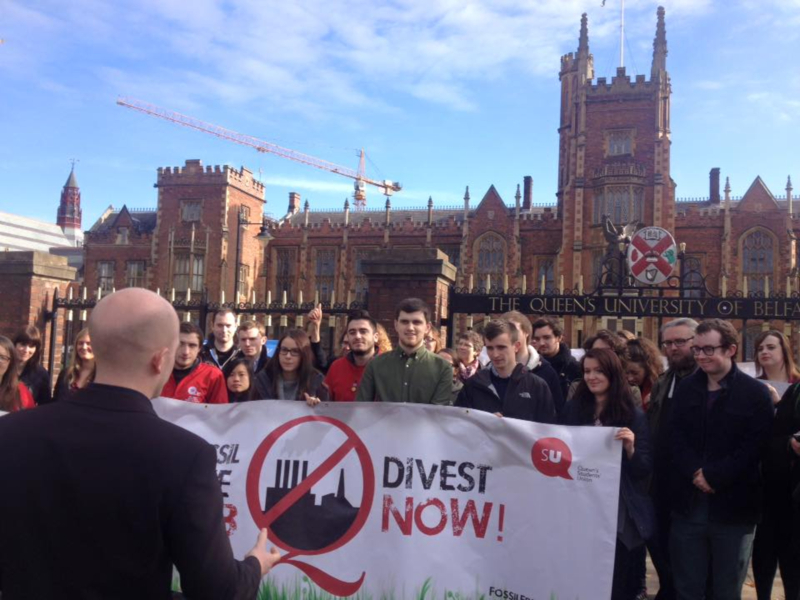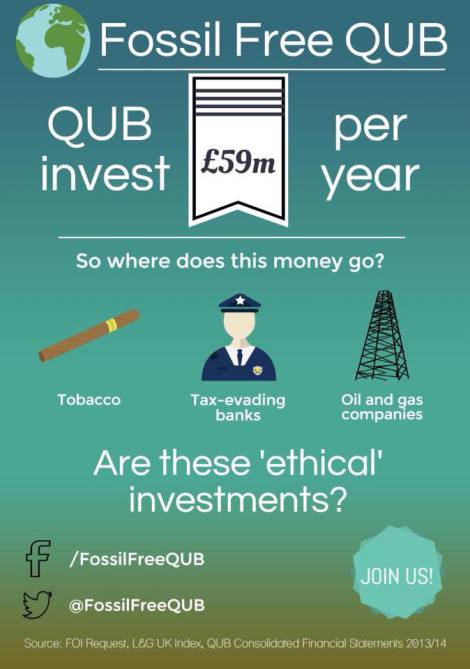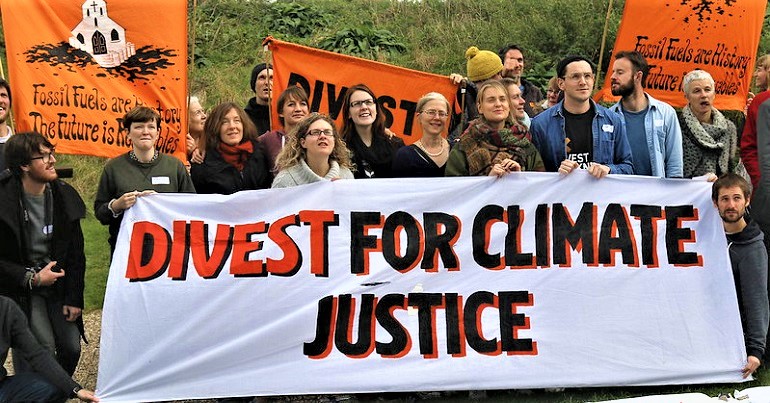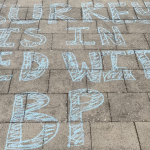How we’re winning: Divesting from climate chaos at Queens University

As a Bruce Springsteen fanatic, I often find myself turning to the philosophical depths of his lyricism when my own words fail me. You can, therefore, understand why I find ‘you can’t start a fire without a spark’ to be a simple yet powerful mantra that can be all too easily applied to political activism and the strategy that guides it.
When Glaswegian activists arrived at Queen’s University Belfast (QUB) in late 2014, fresh off their landmark fossil fuel divestment victory against Glasgow University, I’m not entirely sure they expected to find such fertile ground for climate activism, and the handful of students and academics who would go on to form Fossil Free QUB. After all, Northern Ireland isn’t exactly famed as a bastion of progressivism.
But they did. From what began as a brief presentation on the successes and tactics of the Glasgow student divestment group, emerged the first major fossil fuel divestment movement on the island of Ireland.
Almost a year has past since the creation of Fossil Free QUB and the campaign has progressed through varying degrees of intensity. In the early stages the focus was placed on the critical but rather menial tasks of primary organisation and analysing what little investment data QUB presented to the public. Our initial Freedom of Information request was rejected; but an appeal process facilitated by the Information Commissioners Office, and lasting almost 10 months has revealed significant investments in organisations and practices that would compel the suits atop the fossil fuels empire to shirk with shame. Of course, these details will be made public in good time.
Interestingly, it took the same length of time before Queen’s University resolved to recognise our campaign, who in October enjoyed a daily presence on campus. Our 47-page academic proposal on the economic and ethical imperatives behind fossil fuel divestment was accepted as an official submission by the Investment Committee on 14th October, who then proceeded to ignore its contents and instead offer a wayward and piecemeal resolution: QUB will review its ethical investment policy (which is half a dozen lines long), but it will take them 6-9 months. The University reaffirmed its position that indirect investments in fossil fuels absolved them of all moral responsibility, and considered the matter closed for the time being.
Those within the ranks of Fossil Free QUB largely viewed this as a rather obvious attempt to eliminate the momentum of our campaign, and kick it into the long grass for it to die a slow, bureaucratic death. Since then the nature and focus of our action has notably shifted. The negotiating stage of this campaign had been opened and abruptly closed by the University’s top brass, who fail to recognise that the progress of our campaign is not, and will not, be dependent on the numbing uniformity of the QUB committee cycle. We proceed on our own terms and with an irrepressible moral zeal afforded to any climate change activist.
The divestment movement continues to spread like wildfire, evidenced by the emergence of a rather formidable team of divestment activists at Trinity College Dublin. Chances are Galway will also find itself embroiled in a similar divestment campaign; I’m told curiosity and discontent is stirring among student climate activists at NUIG.
This rapid spread should come as no surprise, however, as, thanks to the work of QUB divestors, the Union of Students in Ireland (USI) has adopted support for divestment groups in colleges across Ireland as a national policy.
When the growth of the campaign is considered in a global context, there is much hope for optimism and the continued prevalence of grassroots divestment activism. In September 2014 the total amount institutions across the planet had divested from fossil fuel corporations stood at $50 billion; in September 2015 it was $2.5 trillion.
There are several reasons as to why the appeal of the cause of divestment, and its role in wider climate justice campaigns, is so irresistible to young activists.
Unlike other political campaigns where both sides bear at least a semblance of legitimacy, the ethical, economic and political benefits of divestment are both overwhelming and indefeasible. Warnings have been issued that our species has already exceeded what is a safe limit of global warming by 2050, and that countless people will suffer as a result. This affords divestors the moral authority to pursue radical action, and the urgency to pursue it now.
Secondly, divestment campaigns possess a remarkable clarity of purpose, an easily identifiable target, a specific demand, and a definitive end. Universities are a hub of political activism, and offer an environment in which intellectual pursuits, righteousness and political energy can flourish. Most major universities possess an investment portfolio that breaches any number of ethical imperatives, and every university who does so can expect to face the wrath of a group of students with determination, a sense of justice, and penchant for FOI requests.
Our campaign at Queen’s University continues to grow. Political activism has been an afterthought in the student movement here for too long, and the urgent and inclusive nature of Fossil Free QUB is forcing a change in this culture of placation. Our initially rejected FOI request has revealed investments at Queen’s University of a reprehensible character that reaches far beyond that of oil and gas corporations: tobacco, tax evading banks and criminally prosecuted pharmaceuticals.
Political parties across the spectrum of national identity, the trade union movement, charities, faith groups, dozens of senior academics at QUB, a host of notable alumni, Noam Chomsky, Bill McKibben, and, most importantly, the student body have called upon Queen’s University to end their practice of profiteering from environmental destruction. They have refused.
This isn’t a case of ‘we can’t’ or ‘we’re trying’, it is a bare-faced refusal to do their bit as a huge public institution to stop destroying our chances at species survival. This is worth bearing in mind as our action escalates, we are young people desperately, and by moral compulsion, wresting back a future that is being actively stolen from us.



Leave a Reply